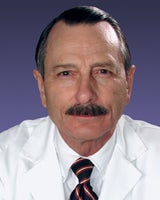
Ralph Brinster, VMD, PhD
Additional Titles:
Richard King Mellon Professor of Reproductive Physiology
Professor of Physiology, Graduate School of Arts & Sciences and Graduate Faculty
Whelan EC, Yang F, Avarbock MR, Sullivan MC, Beiting DP, Brinster RL (2022) spermatogenesis after more than 20 years of cryopreservation of rat spermatogonial stem cells reveals an important impact in differentiation capacity. PLOS Biol 20(5): e3001618. https://doi.org/10.1371/journal. pbio.300.
Sinha N, Whelan EC, Tobias JW, Avarbock M, Stefanovski D, Brinster RL. Roles of Stra8 and Tcerg1l in retinoic acid induced spermatogonial differentiation in mouse. Biology of Reproduction, 2021, 1-16 doi:10.1093/biolre/ioab093
Yang, F., Whelan, E., Guan, X., Bingquan, D., Shu, W., Sun, J., Avarbock, M.R, Wu, X., Brinster, R.L. FGF9 promotes mouse spermatogonial stem cell proliferation mediated by p38 MAPK signaling. Cell Prolif. 2021;54: e12933. https://onlinelibrary.wiley.com/doi/10.1111/cpr.12933.
Ginsberg, J. and Brinster, R.L. Transplantation of Cryopreserved Spermatogonia. In: Fertility Preservation: Principles & Practice, Second Edition. Chap. 18, Fertility Preservation Strategies in the Male. Editors: Donnez, J. and Kim, S., Cambridge University Press. 2021. ISBN: 9781108494595.
Sinha, N., Whelan, E. and Brinster, R.L. Isolation, cryopreservation, and transplantation of spermatogonial stem cells. In: Chimera Reseach: Methods and Protocols. Editors: Hyun, I. and De Los Angeles, A. Springer Science Business Media, LLC. 2019; Vol. 5, Chap. 14: 205-220.
Kubota, H., and Brinster, R.L. Spermatogonial stem cells. Biol. Reprod. 2018 Mar.; 99(0) 50th Anniversary Special Issue: 1-23. DOI: 10.1093/biolre/ioy077; PMID: 29617903.
Kubota, H. and Brinster, R. L. Spermatogonial transplantation and SSC competence. In: Encyclopedia of Reproduction, Second Edition. Aug. 2018; Vol.3, Chap. 18, Gametogenesis, Fertilization and Early Development. Editors: McCarrey, J. and Wei, Y. Elsevier.
Kubota, H. and Brinster, R. L. Germ Cell Transplantation. In: Encyclopedia of Reproduction, Second Edition. Aug. 2018; Vol. 1, Chap. 29, Male Reproduction. Editors: Jégou, B. and Skinner, M.K., Elsevier.
Kubota, H. and Brinster, R. L. Culture and transplantation of spermatogonial stem cells. In: The Biology of Mammalian Spermatogonia. Editors: Oatley, J. M. and Griswold, M. D. Springer Publishing. 2017. Chap. 11: 271-300
Goodyear, S. and Brinster, R.L. Isolation of the spermatogonial stem cell-containing fraction from testes. In: Cold Spring Harbor Protocol. Apr. 2017; (4): 289-292. DOI: 10.1101/pdb. prot094185; PMID: 28373492.
Goodyear, S. and Brinster, R.L. Culture and expansion of primary undifferentiated spermatogonial stem cells. In: Cold Spring Harbor Protocol. Apr. 2017; (4): 293-6. DOI: 10.1101/pdb. prot094193; PMID: 28373493.
Oatley, J.M. Brinster, R.L. The germline stem cell niche unit in mammalian testes. Physiol. Rev. 92: 577-95, 2012.
Ginsberg, J. P., Brinster, R. L. Transplantation of cryopreserved spermatogonia. Principles & Practice of Fertility Preservation Chapter 15, Section IV : 199-208, 2011.
Oatley, J. M., Oatley, M. J., Avarbock, M. R., Tobias, J. W., Brinster, R. L. Colony stimulating factor 1 is an extrinsic stimulator of mouse spermatogonial stem cell self-renewal. Development 136: 1191-1199, 2009.
Wu, X, Schmidt, J.A., Avarbock, M.R., Tobias, J. W., Carlson, C. A., Kolon, T. F., Ginsberg, J. P., Brinster, R. L. Prepubertal human spermatogonia and mouse gonocytes share conserved gene expression of germline stem cell regulatory molecules. Proceedings of the National Academy of Sciences of the United States of America 106: 21672-21677, 2009.
Oatley, J. M., Brinster, R. L. Regulation of spermatogonial stem cell self-renewal in mammals. Annu. Rev. Cell Dev. Biol. 24: 263-286, 2008.
Brinster, R.L. Male germline stem cells: from mice to men. Science 316: 404-5, 2007.
Kubota, H. Avarbock, M.R. Brinster, R.L. Growth factors essential for self-renewal and expansion of mouse spermatogonial stem cells. Proc. Natl. Acad. Sci. USA 101: 16489-94, 2004.
Brinster, R.L. Germline stem cell transplantation and transgenesis. Science 296: 2174-6, 2002.
The research in Dr. Brinster’s laboratory focuses on the biology of the spermatogonial stem cell (SSC), which is responsible for the continuity of spermatogenesis in the adult male. A spermatogonial transplantation technique has been developed that provides a functional assay of stem cell activity, thereby enabling for the first time an analysis of this unique and valuable stem cell population. Using the transplantation assay the surface antigenic profile of the SSC has been established for several species, and this information allows highly enriched populations of stem cells to be obtained. These enriched SSCs from mouse and rat can now be cultured, and their number increased for long periods. Techniques to extend the culture system to farm animals and primates are under investigation. Additionally, genes are being introduced into the SSC as a technique to modify the germline of animals. Development of culture and gene modification methods for rodent SSCs will lay the foundation for similar approaches in larger animals, particularly farm animals. The culture and enrichment strategies also are being used to study gene activity in stem cells and differentiating daughter cells arising from the stem cells. Using similar methods, signaling pathways active in the fate decision determining stem cell self-renewal or differentiation are under investigation. Since the SSC is the only adult stem cell for which there exists a long-term in vitro culture system and a quantitative functional transplantation assay, it provides a powerful model to understand stem cell function in all adult stem cell systems. In addition, the SSC is the only stem cell in the adult that continually replicates and transmits genes to the next generation. Perhaps most important, it is the vehicle for species continuity and evolutionary adaptation.
Jackson Laboratory, Bar Harbor, Maine, Summer. (1960)
Postdoctoral Fellow
Marine Biological Laboratory, Woods Hole, Massachusetts, Summer. (1962)
Postdoctoral Fellow
Graduate School Arts & Sciences, University of Pennsylvania (1960 to 1961)
America Veterinary Medical Association Fellow
Graduate School of Arts & Sciences, University of Pennsylvania (1961 to 1964)
Pennsylvania Plan Scholar
Education:
PhD (Graduate School of Arts & Science) University of Pennsylvania, 1964 VMD (School of Veterinary Medicine) University of Pennsylvania, 1960 BS (School of Agriculture) Rutgers University, 1953
Contact:
University of Pennsylvania
School of Veterinary Medicine
3800 Spruce Street
Philadelphia, PA 19104
